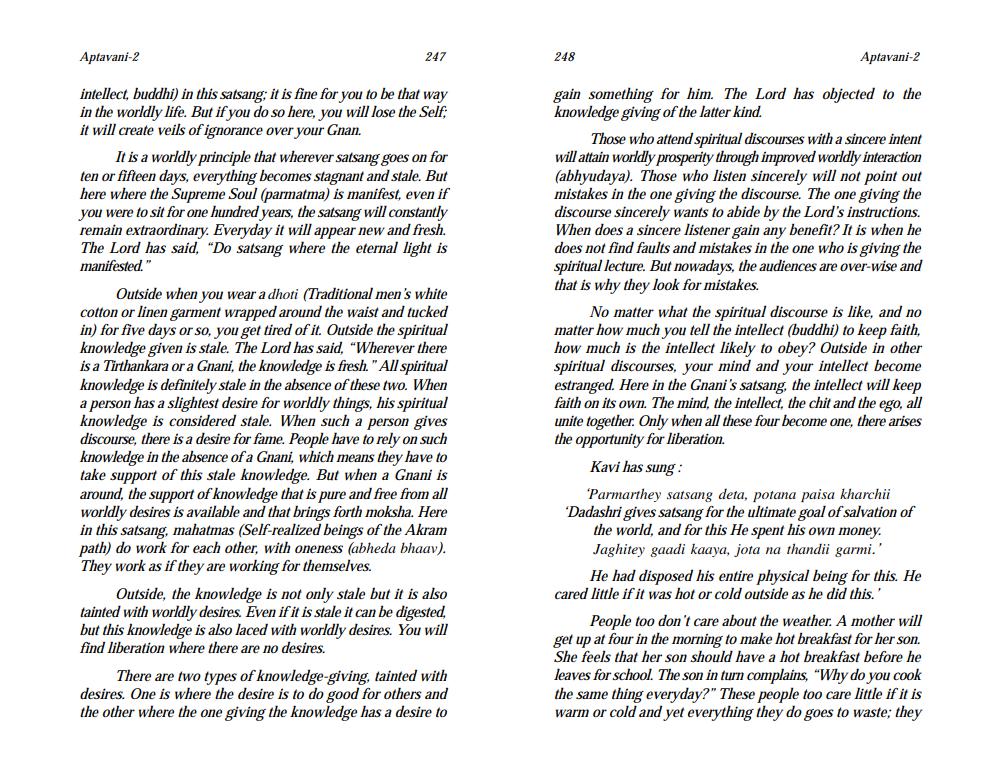________________
Aptavani-2
247
248
Aptavani-2
intellect, buddhi) in this satsang: it is fine for you to be that way in the worldly life. But if you do so here, you will lose the Self; it will create veils of ignorance over your Gnan.
It is a worldly principle that wherever satsang goes on for ten or fifteen days, everything becomes stagnant and stale. But here where the Supreme Soul (parmatma) is manifest, even if you were to sit for one hundred years, the satsang will constantly remain extraordinary. Everyday it will appear new and fresh. The Lord has said, "Do satsang where the eternal light is manifested."
Outside when you wear a dhoti (Traditional men's white cotton or linen garment wrapped around the waist and fucked in) for five days or so, you get tired of it. Outside the spiritual knowledge given is stale. The Lord has said, "Wherever there is a Tirthankara or a Gnani, the knowledge is fresh. "All spiritual knowledge is definitely stale in the absence of these two. When a person has a slightest desire for worldly things, his spiritual knowledge is considered stale. When such a person gives discourse, there is a desire for fame. People have to rely on such knowledge in the absence of a Gnani, which means they have to take support of this stale knowledge. But when a Gnani is around, the support of knowledge that is pure and free from all worldly desires is available and that brings forth moksha. Here in this satsang, mahatmas (Self-realized beings of the Akram path) do work for each other, with oneness (abheda bhaav). They work as if they are working for themselves.
Outside, the knowledge is not only stale but it is also tainted with worldly desires. Even if it is stale it can be digested, but this knowledge is also laced with worldly desires. You will find liberation where there are no desires.
There are two types of knowledge-giving, tainted with desires. One is where the desire is to do good for others and the other where the one giving the knowledge has a desire to
gain something for him. The Lord has objected to the knowledge giving of the latter kind.
Those who attend spiritual discourses with a sincere intent will attain worldly prosperity through improved worldly interaction (abhyudaya). Those who listen sincerely will not point out mistakes in the one giving the discourse. The one giving the discourse sincerely wants to abide by the Lord's instructions. When does a sincere listener gain any benefit? It is when he does not find faults and mistakes in the one who is giving the spiritual lecture. But nowadays, the audiences are over-wise and that is why they look for mistakes.
No matter what the spiritual discourse is like, and no matter how much you tell the intellect (buddhi) to keep faith, how much is the intellect likely to obey? Outside in other spiritual discourses, your mind and your intellect become estranged. Here in the Gnani's satsang, the intellect will keep faith on its own. The mind, the intellect, the chit and the ego, all unite together. Only when all these four become one, there arises the opportunity for liberation
Kavi has sung :
'Parmarthey satsang deta, potana paisa kharchii 'Dadashri gives satsang for the ultimate goal of salvation of
the world, and for this He spent his own money. Jaghitey gaadi kaaya, jota na thandii garmi.
He had disposed his entire physical being for this. He cared little if it was hot or cold outside as he did this.'
People too don't care about the weather. A mother will get up at four in the morning to make hot breakfast for her son. She feels that her son should have a hot breakfast before he leaves for school. The son in turn complains, "Why do you cook the same thing everyday?" These people too care little if it is warm or cold and yet everything they do goes to waste; they




